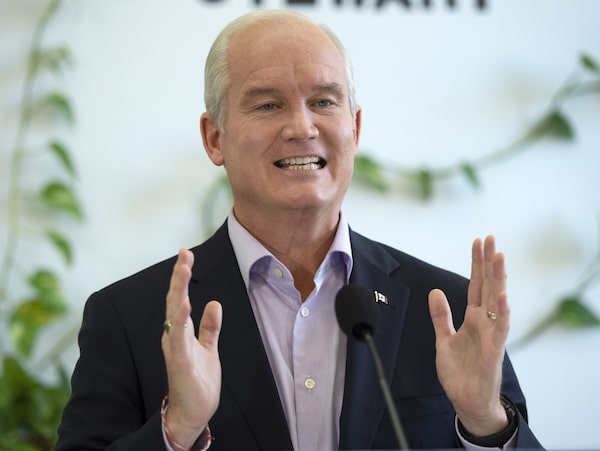
Conservative Leader Erin O’Toole speaks to the media as he makes an announcement, in Edmonton, Saturday, Aug. 21, 2021. O'Toole acknowledged Saturday a long-simmering sentiment within Conservative circles: the Tory leader's carbon-pricing scheme is not universally beloved among the party faithful.Ryan Remiorz/The Canadian Press
Conservative Party Leader Erin O’Toole defended his plan to price carbon but acknowledged the criticism it has generated during his first federal election campaign stop in Alberta on Saturday.
“I do get some questions about it, and sometimes people are frustrated about that, but it shows my commitment,” Mr. O’Toole said Saturday at a news conference in Edmonton.
Mr. O’Toole said his plan, which was announced in April and a major departure given the party’s previous opposition to the federal program, is a “critical part” of the Tory Recovery Plan and is central to his outreach to voters.
This election, the Conservatives finally have a credible climate plan. But is it good enough?
Canadian federal election 2021: Latest updates and essential reading ahead of Sept. 20 vote
In the last federal election, the Conservatives won all but one seat in Alberta, which is key to Canada’s oil and gas industry and home to the most vocal criticism of the federal carbon pricing program.
The price proposed by the Conservatives is lower than that of the Liberals, starting at $20 a tonne and increasing to a maximum $50. The Liberals price carbon at $40 a tonne, and that will increase to $50 next year and then rise by $15 annually until 2030. The Conservative plan also proposes so-called personal low-carbon savings accounts that consumers pay into when they purchase hydrocarbon-based fuel.
The savings can then be used towards purchases to help live a “greener life” such as a transit pass or bicycle. The current carbon tax structure rebates the estimated cost of fuel charges to residents in Ontario, Saskatchewan, Manitoba and Alberta when they file their income taxes. Mr. O’Toole has accused the Liberals of only returning some of the carbon tax revenue to Canadians.
The release of the plan came after a party convention earlier this year during which delegates voted against a motion on recognizing that climate change is real. During the same convention, Mr. O’Toole said the party needed a “credible alternative” to Liberal Leader Justin Trudeau’s climate-change policy.
Also, Saturday, Mr. O’Toole outlined details of his plan to help Canadians with disabilities by doubling the disability supplement in the Canada Workers Benefit from $713 to $1,500. He said the Conservatives would also reduce the number of hours required to qualify for the Disability Tax Credit and the Registered Disability Savings Plan from 14 to 10 hours per week and vowed to work with the premiers to ensure federal programs work better with provincial plans.
“Our country’s become fractured under Mr. Trudeau, in part because there’s always an Ottawa-knows-best approach,” he said.
Mr. O’Toole is on a three-day western swing that also saw him visit Winnipeg, where he talked about the party’s job-creation program, and Saskatoon, where he held an outdoor rally on Friday.
He was to hold another rally in Delta, B.C. south of Vancouver on Saturday night before returning to Ottawa late Sunday.
It’s the first time the Conservative Leader has travelled west of Ontario since the start of the election. Until now, Mr. O’Toole has largely been making an appeal to voters through telephone town halls that are posted on social media and shot in a studio in a downtown Ottawa hotel.
Mr. Trudeau was not on the campaign trail on Saturday, with a party advisory stating his commitments Saturday were “private.”
While it is not unusual for party leaders to take a down day on Saturdays because it’s traditionally the day when parties return to home base to regroup, the current election has opened Mr. Trudeau up to criticism for launching a campaign as a fourth wave of the COVID-19 pandemic unfolds.
So it was that NDP Leader Jagmeet Singh needed little prompting when reminded of Mr. Trudeau’s blank itinerary as he began his day in Toronto.
“I don’t know what his schedule is and why he’s not campaigning... I can just say for me, on housing specifically and on many other things, Trudeau has been missing in action,” Mr. Singh said, as he promised a supplement of up to $5,000 for those struggling to pay rent and a crackdown on so-called “renovictions.”
New Democratic Party (NDP) leader Jagmeet Singh speaks as he supports local candidate Paul Taylor, during his election campaign tour in Toronto, Ontario, Canada August 21, 2021.CHRIS HELGREN/Reuters
“He has been missing when it comes to helping people who are struggling with trying to find a place they can rent, (and) with people are struggling to find a place they can buy.”
Mr. Trudeau called the election last Sunday, triggering a campaign that will send voters to the polls on Sept. 20.
With a report from The Canadian Press.
Follow the party leaders and where they stand on the issues this election campaign by signing up for our Morning or Evening Update newsletters.
For subscribers only: Get exclusive political news and analysis by signing up for the Politics Briefing.
 Ian Bailey
Ian Bailey